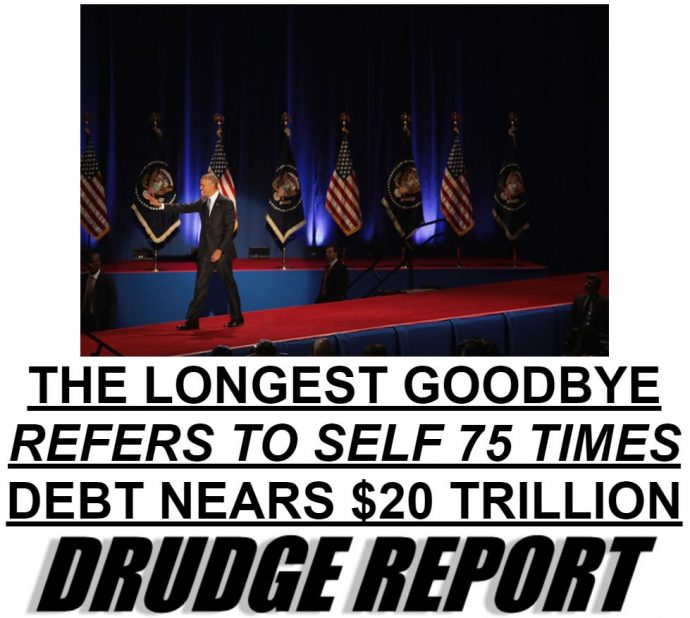Here are the editors at National Review writing about Obama’s sad “farewell address,” in which, by the way, he mentioned himself (as the Drudge headline above states) seventy-five times!
The president is leaving the same way he came in: with a great deal of vague and fruity talk about “hope and change,” very little of genuine interest, and an undercurrent of bitterness communicating his unshakeable belief that the American people just simply are not up to the task of fully appreciating History’s unique gift to them in the person of Barack Obama.
And he is so terribly disappointed in us! Having just endured the electorate’s rejection of his party and his mode of politics with the election of Donald Trump, and grimly considering the likely dismantling of much of his executive-order legacy, President Obama gave a speech about how our democracy has failed and why. You’ll be something less than shocked to learn that his belief is that Americans are so beguiled and befouled by racism and prejudice that we failed to cultivate the sacred spark the Promethean president handed down to us.
Oh, and we watch too much Fox News and read too many Facebook posts from that right-wing uncle of myth and lore, which deprives us of a “common baseline of facts.”
How did we get here? Barack Obama’s sales pitch was threefold. (His boasting about “marriage equality” suggests that he may have forgotten he ran against that, so he might need some reminding.) First, he would end our expensive, bloody, and thankless campaign in Iraq and replace the assertive thinking behind it with a more sensitive and intelligent global stance that would raise America’s standing in the world and usher in a new era of peace, cooperation, and security. Second, he would turn his attention to domestic affairs, especially the vexing question of health care, which he proposed to rationalize through a single, large, complex package of legislation (and subsequent regulations) that would transcend ideology and be driven instead by disinterested empiricism in the pursuit of pragmatic and effective outcomes. Third — third because the crisis that precipitated it came relatively late in the electoral season — he would lift the country up from the recession that followed the 2008–09 financial crisis, relying on a series of “investments” in infrastructure projects, renewable-energy research, and the like, steering clear of the policies that had for years disproportionately enriched the wealthy, especially large institutional investors and their executives, structuring his policies in a way that would maximize benefits to the middle class and those aspiring to it.
Read more: National Review

